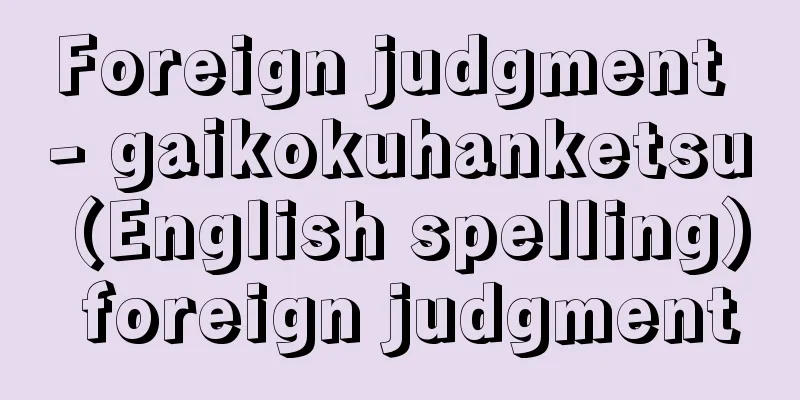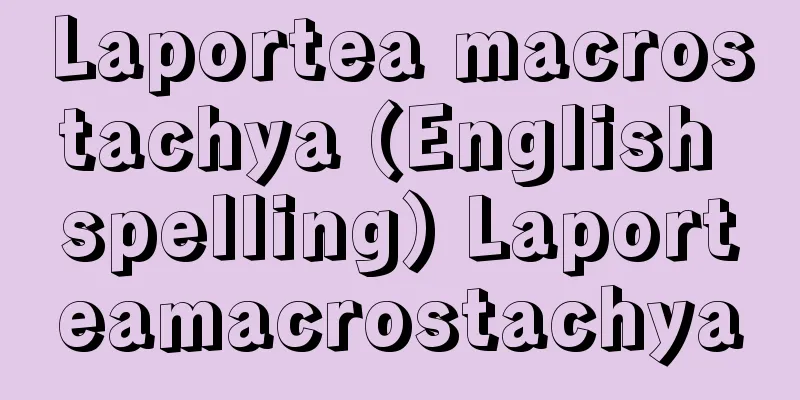Foreign judgment - gaikokuhanketsu (English spelling) foreign judgment

|
Foreign court judgments. OverviewUnder international law, national sovereignty is independent of one another. For example, country B is not obligated to recognize the effect of a court judgment in country A within the territory of country B, nor to enforce the content of the judgment by force. However, if countries were to completely not recognize the effect of foreign judgments, this would be inappropriate in light of the reality of the activities of people and companies that are conducted across borders. In particular, for civil judgments that relate to the rights, obligations, and legal relationships of private individuals, if the effect of the judgment did not extend beyond borders, inconveniences would arise, such as, for example, a person who is obligated to pay in country A would not be able to make payments even if he or she has assets in country B, or a person who has obtained a divorce judgment in country A but is still married in country B and cannot remarry. Therefore, it is common for foreign civil judgments to be distinguished from foreign criminal judgments, and for foreign civil judgments to be recognized as having a certain degree of effect, certain requirements are set by the country that accepts the effect of the judgment, based on international comity, which means paying a certain degree of respect to the national actions of other countries, and foreign judgments are generally recognized as having a certain degree of effect if these requirements are met. In contrast, foreign criminal judgments are penalties that have a very strong public authority and are deeply rooted in the public interest of each country, so in principle, sentences are not executed based on foreign judgments. However, there are also countries (such as China) that do not recognize the validity of foreign judgments in civil cases unless there is a mutual treaty-based commitment between the two countries. As mentioned above, there is no obligation under international law to recognize or enforce the validity of foreign judgments, so the measures of these countries do not violate international law. On the other hand, with regard to foreign criminal judgments, criminals who have fled from other countries are extradited to a certain extent (Fugitive Offenders Extradition Act). European countries have been making bilateral treaty arrangements regarding the recognition and enforcement of foreign civil judgments since the 18th century. The Treaty on the Establishment of the European Community (EC) stipulated that arrangements should be made for the mutual recognition and enforcement of judgments within the region, and so in 1968 the Convention on Jurisdiction and Enforcement of Judgments in Civil and Commercial Matters (known as the Brussels Convention) was created, which was revised as the EC's member states expanded, and since 2002 it has been in principle enforced as a regulation among EU (European Union) member states. In addition, EU member states have concluded a treaty called the Lugano Convention with three countries, Switzerland, Iceland, and Finland, which stipulates that almost the same provisions apply, and in effect, the standards for international jurisdiction and the recognition and enforcement of foreign judgments are unified among major European countries in terms of their mutual relations. There is also a framework called the La Paz Convention among Latin American countries. In contrast to these regional treaties, there is no treaty covering the entire world, including the United States and Japan. In response, the Hague Conference on Private International Law, an international organization that has been working to unify international private law since the end of the 19th century, began work on creating a global treaty including rules on international judicial jurisdiction in 1996, but there are significant differences between the international judicial jurisdiction rules of the United States and other countries, and the project was terminated after only creating a jurisdiction agreement treaty in 2005. However, a global treaty-making project focusing solely on the recognition and enforcement of foreign judgments has since been restarted. [Masato Michigauchi May 19, 2016] Treatment of foreign civil judgments in JapanRegarding the treatment of civil judgments of foreign courts in Japan, Article 118 of the Civil Procedure Act provides for the recognition of their effect in Japan, and Article 24 of the Civil Execution Act provides for compulsory execution. The latter directly quotes the requirements set out in the former, so the requirements are the same for both. That is, the judgment must be a final and binding judgment of a foreign court (Civil Procedure Act Article 118, main text), the foreign court that issued the judgment must have international jurisdiction from the perspective of Japan (requirements for indirect general jurisdiction, Article 118, item 1), the losing defendant must have received the summons or order necessary for the commencement of litigation without relying on service of notice, etc., or must have responded to the lawsuit (Article 118, item 2), the content of the judgment and the litigation procedure must not violate the public order of Japan (Article 118, item 3), and there must be a mutual guarantee (Article 118, item 4). The validity of the judgment is not reviewed (prohibition of reexamination on the merits, Civil Execution Act Article 24, paragraph 2). Foreign judgments that meet the requirements are recognized as having effect in Japan without going through any special procedures (automatic recognition system). The recognized effect is that of the law of the country of the judgment, but if the personal and material scope is too broad from a Japanese perspective, recognition will be limited to partial recognition. Enforcement is granted by a lawsuit seeking execution of the judgment in Japan. Note that, as for formative judgments such as divorce judgments, some are of the opinion that because they form legal relations under substantive law, examination should be conducted to see whether the applicable law that should be applied in Japan is applied. However, recent precedents have directly applied the requirements of Article 118 of the Code of Civil Procedure, and this is also supported by the majority opinion. For example, in a case where a California court ordered a Japanese company, which was the parent company of a Californian subsidiary, to pay punitive damages and the enforcement of the judgment in Japan was sought, the Supreme Court ruled on July 11, 1997 (Minshu Vol. 51, No. 6, p. 2573) that enforcing such a punitive judgment to set an example was against Japanese public order and refused to allow the enforcement. Some have argued that the same conclusion should be reached because it is not a civil judgment in the first place. In addition, in a case where a Washington DC judgment was sought to be enforced in Japan, the Supreme Court ruled on June 7, 1983 (Minshu Vol. 37, No. 5, p. 611) that if the validity of a Japanese judgment is recognized under conditions that are not different in important respects from those in Japan, then there is a mutual guarantee, and the judgment was allowed to be enforced. This is a change from the previous Supreme Court ruling, which had not recognized the requirements for mutual guarantee as long as the Japanese judgment is not recognized under conditions that are the same as or more lenient than the requirements for recognition and enforcement of foreign judgments in Japan, the requirements for mutual guarantee are not met. [Masato Michigauchi May 19, 2016] Treatment of foreign criminal judgments in JapanThe Penal Code provides for the punishment of certain crimes committed abroad. As a result, acts committed abroad may violate the penal laws of that country and also violate Japanese penal laws. For example, in the case of murder, if the perpetrator is Japanese, Article 199 of the Japanese Penal Code applies even if the murder is committed abroad. Since the act violates the penal laws of the country in which it was committed, one act violates the laws of two countries. The question then becomes whether a person who has been punished for an act in a foreign country can be punished again in Japan. Generally, the legal interests protected by criminal punishment belong to the country that enacted the law, so a criminal conviction and punishment in a foreign country does not mean that the legal interests in Japan are restored. Therefore, according to Article 5 of the Penal Code, a person who has received a final and binding sentence in a foreign country may be punished if the same act is also a crime under Japanese law. However, if the sentence is executed in whole or in part in a foreign country, the execution of the sentence in Japan may be reduced or waived. As with the aforementioned foreign civil judgments, foreign criminal judgments are not enforced in Japan. Since criminal trials usually require the defendant to appear in court, it is rare for a judgment to be executed in a foreign country. Even if such a situation does arise, it is usually dealt with through extradition. [Masato Michigauchi May 19, 2016] "Takakuwa Akira and Michigauchi Masato (eds.), "New Judicial Practice Series 3: International Civil Procedural Law (Property Law Related)" (2002, Seirin Shoin)" ▽ "Homma Yasunori et al., "International Civil Procedural Law" 2nd Edition (2012, Yuhikaku)" ▽ "Sawaki Takao and Michigauchi Masato, "Introduction to Private International Law" 7th Edition (2012, Yuhikaku)" [References] | | |Source: Shogakukan Encyclopedia Nipponica About Encyclopedia Nipponica Information | Legend |
|
外国裁判所の判決。 概説国際法上、国家主権は相互に独立しているので、たとえば、A国の裁判所の判決の効力をB国がB国領域内で認め、また強制的にその内容を実現すべく強制執行する義務はない。しかし、だからといって、相互に外国判決の効力をまったく認めないこととすると、国境を越えて営まれている人や企業の活動の実態からみて不適当である。とくに私人の権利義務や法律関係にかかわる民事判決については、国境を越えれば判決の効力はいっさい及ばないとすれば、たとえば、A国で支払義務がある者がB国に財産をもっていても手出しができず、また、A国で離婚判決を得ているのにB国では夫婦のままであって再婚ができないといった不都合が生ずる。そこで、外国民事判決と外国刑事判決とに分け、外国民事判決については、国際的な法秩序の構築・維持の観点から、あるいは他国の国家行為に一定の敬意を払うという国際礼譲international comityに基づき、判決の効力を受け入れる国の側で一定の要件を設けて、それを具備することを条件に外国判決に一定の効力を認める例が一般的である。これに対し、外国刑事判決については、それが刑罰というきわめて公権力性の強いものであり、各国の公益に深く根ざしたものであるため、原則として外国の判決に基づいて刑の執行をするということはない。しかし、民事判決についても、相互に条約に基づく約束をしていない限り、外国判決の効力はいっさい認めない国(中国など)もある。既述のように、もともと外国判決の効力を承認・執行しなければならないという国際法上の義務はないので、これらの国の措置が国際法違反となるわけではない。他方、外国刑事判決についても、外国から逃亡してきた犯罪人については、一定の範囲で、犯罪人の引渡しを行っている(逃亡犯罪人引渡法)。 外国民事判決の承認・執行については、ヨーロッパ各国の間では18世紀ごろから2国間条約による取決めをしていた。そして、EC(ヨーロッパ共同体)の設立条約において、域内での判決の相互承認・執行を図る取決めの作業をすべきことが規定されたため、1968年に「民事及び商事に関する裁判管轄及び判決の執行に関する条約」(ブリュッセル条約とよばれる)が作成され、これがECの加盟国拡大に伴って改正され、さらに、2002年からは原則としてEU(ヨーロッパ連合)加盟国の間では規則の形で施行されている。また、EU加盟国はスイス、アイスランド、フィンランドの3か国との間でもほぼ同様の内容の規定を適用することを定めたルガノ条約とよばれる条約を締結しており、実質的に、ヨーロッパの主要国の間では国際裁判管轄と外国判決の承認・執行の基準がその相互関係については統一されている。また、中南米諸国の間にも、ラ・パス条約とよばれる枠組みが存在する。これらの地域条約に対し、アメリカや日本を含む世界全体をカバーする条約はまだ存在しない。そこで、19世紀の末から国際私法の統一を任務とする活動をしてきた国際機関であるハーグ国際私法会議は1996年から国際裁判管轄ルールの規律も含む世界的な条約の作成作業を進めたが、アメリカと他の国々の国際裁判管轄ルールの違いが大きく、2005年に管轄合意条約を作成しただけでこのプロジェクトは終了した。しかし、その後、外国判決の承認・執行だけに対象を絞った世界的な条約作成プロジェクトが再開されている。 [道垣内正人 2016年5月19日] 日本における外国民事判決の扱い日本における外国裁判所の民事判決の扱いについては、民事訴訟法第118条においてその効力の日本での承認について規定され、民事執行法第24条においては強制執行について規定されている。後者は前者の定める要件をそのまま引用して規定しているので、両者とも要件は同じである。すなわち、外国裁判所の確定判決であること(民事訴訟法118条柱書)、判決を下した外国裁判所が日本からみて国際裁判管轄を有すること(間接的一般管轄の要件、同法118条1号)、敗訴の被告が公示送達等によらないで訴訟の開始に必要な呼出し・命令の送達を受けたこと、または応訴したこと(同法118条2号)、判決の内容・訴訟手続が日本の公序に反しないこと(同法118条3号)、および相互の保証があること(同法118条4号)、という要件である。裁判の当否は審査されない(本案再審査の禁止、民事執行法24条2項)。要件を具備している外国判決は特別の手続を経ることなく日本での効力を認められる(自動承認制度)。承認される効力は判決国法上のそれであるが、人的・物的範囲が日本からみて広すぎる場合には部分的な承認にとどめられる。執行力は日本での執行判決請求訴訟により付与される。なお、離婚判決のような形成判決についてはそれが実体法上の法律関係を形成するものであるため、日本で適用されるべき準拠法が適用されているか否かを審査すべきであるとの見解もあるが、前記の民事訴訟法第118条の要件をそのまま適用するのが最近の判例であり、また、多数説もこれを支持している。 具体的に争われた事例として、たとえば、アメリカのカリフォルニア州の裁判所が現地子会社の親会社にあたる日本企業に懲罰的損害賠償の支払いを命ずる判決を下し、その日本での執行が求められた事例において、最高裁判所平成9年7月11日判決(民集51巻6号2573頁)は、そのような見せしめのための制裁的な判決を執行することは日本の公序に反すると判断し、その執行を認めないとした。これについては、そもそも民事判決に該当しないとの理由で同じ結論を導くべきであるとの見解もある。また、ワシントンDCの判決の日本での執行が求められた事案において、最高裁判所昭和58年6月7日判決(民集37巻5号611頁)は、日本と重要な点で異ならない条件の下に日本の判決の効力を認めている場合には相互の保証があるものと扱うと判断し、その判決の執行を認めた。これは、日本における外国判決承認・執行要件と同じかそれよりも緩やかな条件で日本判決を認めるのでなければ、相互の保証の要件の具備は認めないとしていた大審院の判決を変更したものである。 [道垣内正人 2016年5月19日] 日本における外国刑事判決の扱い刑法は、一定の犯罪については、国外犯の処罰を定めている。その結果、外国で行われた行為については、その外国の刑法違反となると同時に、日本の刑法にも違反するということがある。たとえば、殺人罪については、犯人が日本人であれば、外国で殺人が行われても、日本の刑法第199条の適用対象とされる。その行為は、その行為のなされた国の刑法違反ともなるため、一つの行為について二つの国の法律に反するということになる。そこで、ある行為について外国で処罰された後、日本でふたたび処罰することができるかが問題となる。一般に、刑罰をもって保護されている法益はその法律を制定している国のものであるので、外国で刑事判決を受けて処罰されたからといって、日本の法益が回復されるわけではない。そのため、刑法第5条によれば、外国において確定判決を受けた者に対しても同一の行為が日本法上も犯罪となるのであればさらに処罰をしてよいとされている。ただし、外国で刑の全部または一部の執行を受けたときは、日本での刑の執行は軽減または免除される。 なお、既述の外国民事判決のように、外国刑事判決を日本で執行することはない。そもそも刑事裁判は被告人の出廷が要件とされているのが通常であるので、外国で執行しなければならない状況になることはあまりないが、仮にそのような状況になったとしても、犯罪人引渡しという形で対処される。 [道垣内正人 2016年5月19日] 『高桑昭・道垣内正人編『新・裁判実務大系3 国際民事訴訟法(財産法関係)』(2002・青林書院)』▽『本間靖規他著『国際民事手続法』第2版(2012・有斐閣)』▽『澤木敬郎・道垣内正人著『国際私法入門』第7版(2012・有斐閣)』 [参照項目] | | |出典 小学館 日本大百科全書(ニッポニカ)日本大百科全書(ニッポニカ)について 情報 | 凡例 |
<<: Foreign Magistrate - Gaikokubugyo
>>: Hai-guo tu-zhi; Hai-kuo t`u-chih
Recommend
Color
...In the cities, men wore black monfuku with hak...
Worker Education - Deaf Worker Education
It refers to education provided primarily to wage...
Hanshan and Shide (English spelling)
Hanshan and Shide, Chinese hermits and poets of th...
Alakoli [Lake] - Alakoli
...The highest point is Mount Tastau (2,992m) on ...
Servant - Servant
A general term for servants who served warriors an...
Tompa M.
… After the defeat in the War of Independence (th...
Osuminomiya (Osaka)
...Ancient palace ruins from the mid-7th century ...
Kakkonto - Kakkonto
This is one of the most well-known Chinese herbal...
Nie'er - Nie'er
Chinese composer. His real name was Shou Xin, and...
Chondrichthyes
...the rest belong to the Gnathostomata, a genus ...
Agricultural calendar - Noujireki
A calendar or calendar book that systematically de...
Quack pen
…The word originates from the Latin penna (wing, ...
Fiscal year - kaikei nendo (English spelling) fiscal year
Although the financial activities of national and...
Sadataka Iba
...A military commander since the early period of...
Underinsurance - ichibuhoken (English spelling)
In non-life insurance, this refers to cases where...









